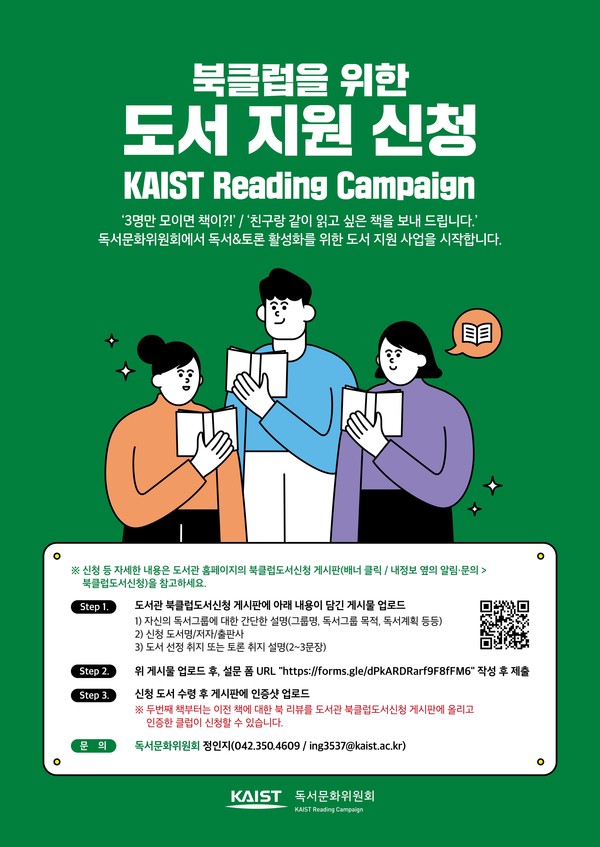For the last few weeks, you probably received a number of emails about book clubs, talks, online book fairs, and other events. This month, The KAIST Herald interviewed the Reading Promotion Committee (RPC), the organizer of these events, to find out who they are and what they do.
Could you briefly introduce the Reading Promotion Committee?
The RPC aims to promote reading for all KAIST members including students, professors, and faculty staff. We are organizing several events, such as choosing the “Reading King” which awards avid readers, holding author book talks, book debates, and book festivals for pre-admission students, and launching the “Reading and Discussion” (HSS199) course.

How was the Reading Promotion Committee formed?
The RPC was formed in May in accordance with the new QAIST initiative proposed by President Kwang Hyung Lee. The Reading Mileage Committee from the School of Humanities & Social Sciences was expanded to include several professors from different departments, student representatives, Academic Information Management Team faculty, and external personnel. With cooperation from the KAIST Library, we are planning many book-related programs for students.
What are Online Book Fairs and how are they organized?
Every fall semester, the library has been organizing book fairs to increase interest in reading and encourage library usage by students and faculty staff. Normally, the book fairs have been held by having both book talks and onsite book fairs where people could order and buy books on the spot. However, because of the COVID-19 pandemic, we are holding these events online with a book delivery service. Hopefully, many students will enjoy and participate in the different programs this Online Book Fair provides, while relieving stress from the pandemic.
How did you choose the authors for the Online Book Fair?
From July 26 to August 8, the Library-RPC had a survey, “KAISTian’s One Pick: Author Book Talks x KAIbook”, to figure out KAIST members’ preferred authors and books. After organizing the Book Talk schedule, methods, and fee, we managed to invite writer Jeong You Jeong on September 28, sci-fi writer Cho-Yeop Kim on November 17, and a professor in architecture, Hyun-joon Yoo, on November 30. 198 KAISTians joined us online for Jeong You Jeong’s book talk, and we hope to see readers of The KAIST Herald join the upcoming book talks!

What inspired the committee to start the KAIbook Letter?
The KAIbook Letter was created to help with frequent problems people face when reading books: it is up to each individual to find [out] why they should read. KAIbook Letter will have opinion editorials on why and how others read books, shared by other KAIST members [to] facilitate people’s quest for an answer. KAIbook Letter also includes “Bookflix” (book recommendations), which will help people to find books to read when they are lost. These op-eds and recommendations will be like a helpful letter from a friend, which will promote a more book-friendly environment for KAIST members.
We are planning on publishing the KAIbook Letter twice annually (Spring and Fall). Our very first edition will be released on October 11, which is the Korean Book Day selected by the Korean Publishers Association. If we steadily publish both issues [and gain] high participation and popularity from KAIST members, we may take publishing more issues yearly into consideration.
What effect do you expect these events will have on the students or the reading culture at KAIST?
Reading should be done independently from the appeal of reading itself and not because someone forces it. A proper reading movement [can be created] not by forcing people to read but by independently sharing book information, getting to know each other through books, and becoming each other’s book mentors. We expect these reading activities to extend beyond our school and affect our local community, including Daedeok Innopolis, ultimately promoting more humanities programs for STEM professionals.
Do you have any future projects?
Next year, the library homepage will be reorganized and a “Reading King” (tentative name) site will open. In this new website, we are implementing several features like community creation and management for book clubs, book recommendations, [and] a “Reading King” point display. With this website, KAIST members will be able to organize book clubs, actively create book reviews, and share book information. Aside from this, as mentioned in the previous question, we will have book talks by Cho-Yeop Kim on November 17 and Hyun-joon Yoo on November 30.
Any last messages for our readers?
We will prepare more events to further promote reading for KAISTians. We hope to see you in different reading culture events throughout the remaining fall semester!

